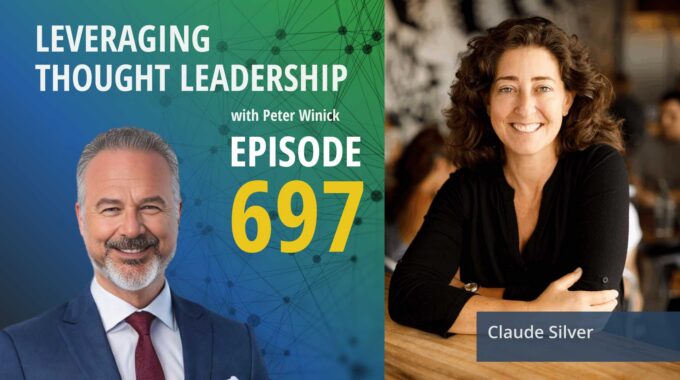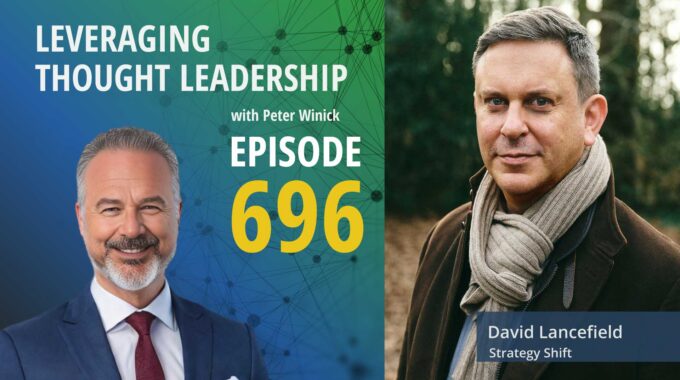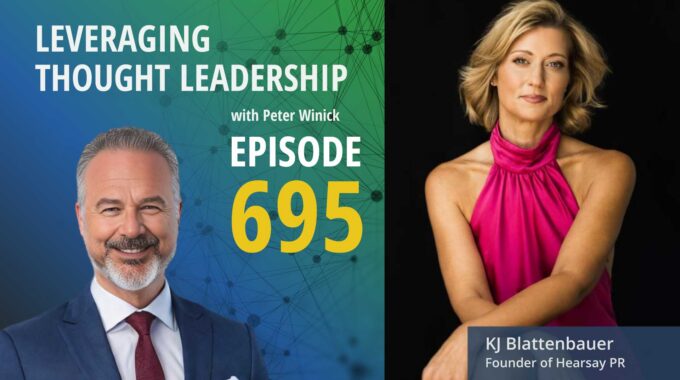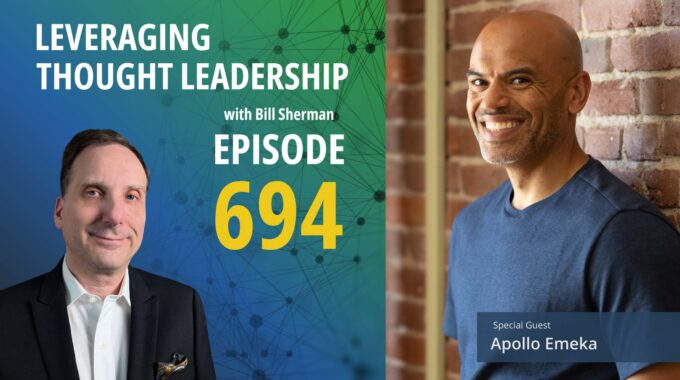Frameworks for connection, accountability, and performance This episode examines how psychological safety drives performance, how…
Short Form vs Long From Reach and Impact | Henry Mintzberg
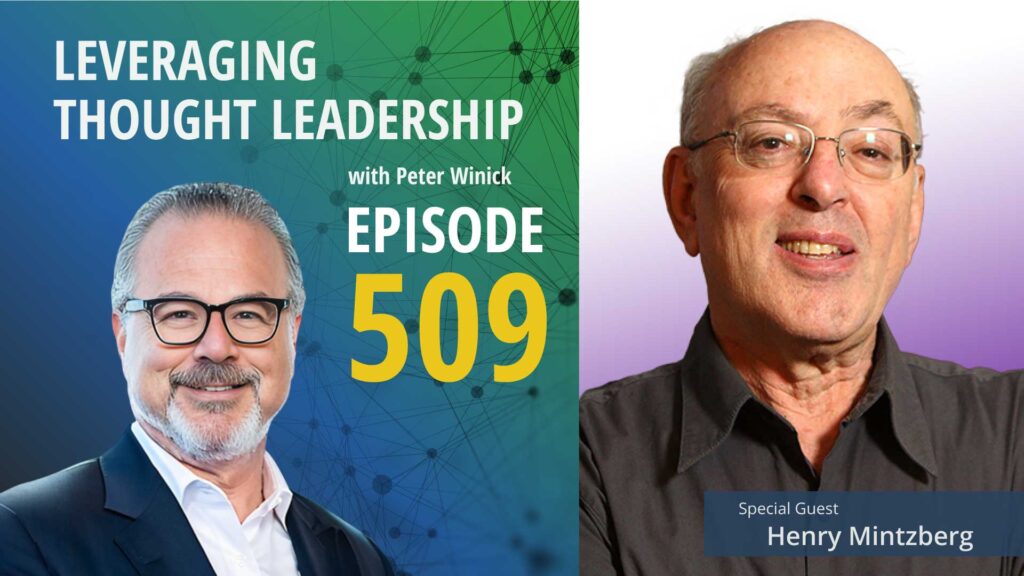
How books can change the world with their ideas in ways that articles do not.
An interview with Henry Mintzberg about his passion for authorship, the impact a book can have, and following your passions.
If fewer people are buying and reading books, why should a thought leader write one?
Today we delve into the world of authorship and publishing with Henry Mintzberg. Henry is a Cleghorn Professor of Management Studies at McGill University and the author of more than 20 books including Managers Not MBAs: A Hard Look at the Soft Practice of Managing and Management Development and Simply Managing: What Managers Do – and Can Do Better.
Our conversation starts by discussing where you find the value in writing a book. Whether it be the intrinsic value of codifying your thought leadership or the extrinsic value of higher engagement and client acquisition.
Henry shares with us his compulsion to write books, regardless of if they succeed or not. He discusses how a few newer books have not done as well as expected and how difficult topics like climate change might play a part in those results.
When publishing about important, but hard topics that many would rather not think about how do you get your message out? Henry talks about expanding into new modalities to capture the audience’s attention and how hard it is to get uninterrupted attention for your topic. He explains how interruption is just one of the reasons a book can have a bigger impact than articles, even if the book reaches only a fraction of the audience a short-form piece might.
Three Key Takeaways:
- Reaching ten thousand people with a book can be far more influential than reaching one hundred thousand people with an article.
- A publication date is not a measurement of value. Many books continue to be relevant years after their publication.
- Do what is in your heart. Don’t let anyone talk you into something else because you will end up doing it badly.
If you need a strategy to bring your thought leadership to market, Thought Leadership Leverage can assist you! Contact us for more information. In addition, we can help you implement marketing, research, and sales. Let us help you so you can devote yourself to what you do best.

Transcript
Peter Winick Welcome, welcome, welcome. This is Peter Winick. I’m the founder and CEO at Thought Leadership Leverage and you are joining us on the podcast, which is Leveraging Thought Leadership today. My guest is kind of a legend, I think is Henry Mintzberg. Henry has written over 20 books, including management, not MBAs, simply managing, rebalancing society and managing the midst of health care. Hundreds of articles, including several that have been prominently placed in Harvard Business Review, and the list goes on. I was fortunate enough to meet Henry in person many years ago at The Thinkers 50 in London, and always I was fanboy a little bit because I’ve always been a big fan and it’s a pleasure to have you on today, Henry. Thank you for spending time with us today.
Henry Mintzberg It’s nice to be here. Great to be here.
Peter Winick So before we get into sort of the current work that you’re doing, which is a little bit different, I just want to get a high-level sort of perspective from you. Given that you’ve written more books than most people read these days, Good, Bad or Ugly, tell us how it’s changed, what an author can expect from a publisher, what a publisher can expect from an author. Is it harder or easier to get the message out? Just give us your sort of macro view on those things.
Henry Mintzberg Yeah, it’s hard to know how much is my own experience and how much is going on in general. But some recent books of mine that I thought might have been more popular, you know, and the publisher put quite a bit of effort into them, have not gone nearly as well as I thought. I wrote a book called Bedtime Stories for Managers, which is a collection of my of certain drugs or blog. I call or tweet for a blog, but their blogs, you would think that would be a kind of an appealing sort of thing. And we put effort into promoting it. But yeah, it’s doing okay. But so I’m not sure, you know, the publisher, who we both know is the percent of people aren’t reading books as much as they did, or they may be buying them, but they’re not reading them.
Peter Winick So they’re not buying or reading them. Stay there for if they’re not buying them or reading them. You know, on one end of the spectrum, you can come to a conclusion that says, Well, I should write them, which is kind of not the conclusion. Right On the other end, you say, Well, what are the other benefits and value in writing a book? And I think about it from an intrinsic to an extrinsic standpoint, so intrinsically, clearly a forcing mechanism to get your thoughts tight. Right, and get it clear and get it polished and then extrinsic, it could be the lead to other things. So how have you changed your expectation from, you know, what you expect from a book?
Henry Mintzberg Well, I haven’t because I just keep going. And that’s partly the answer to your question, which is I think many of us are compelled to write books. You know, we read articles and we read other things, but certain people just feel compelled to write books and they write one book after another. I’ve written 21 of them. I had lunch the other day with somebody who’s written, I don’t know how many, maybe 15. So I think it’s kind of built in and therefore there’s no change in expectations. It’s kind of like, I’m going to get this down whether it sells or not. Now, Peter, there’s another angle to this, which I’ve always maintained and I think is important, which is it’s books that change things, not articles, because no matter how compelling or important an article is, you read it and you go on to the next one and 10 minutes or ten days later you’ve forgotten about it. You know, you just kind of move from one article to now. That’s interesting. Or that could change the world. Yeah, and then go on.
Peter Winick So stay with that though, because I agree with you that. But I think it’s a chicken and egg piece. There are many articles that then become a book, right?
Henry Mintzberg Oh, yes.
Peter Winick And then there are many books that you look at and say that should have stayed in article. How do you deal with that?
Henry Mintzberg Yes. Yes. Any books that should have said? Articles and then the articles? Books become articles. I just had a piece turned down because they said, Well, the book’s been out for a few months, but usually in the same I could say it’s the Harvard Business Review. I don’t think it’s any secret, but my most successful article in the Harvard Business Review was published in 1975, and it was one of their most successful articles of all time. But the book came out in 73 and they didn’t mind then. But now my book on structuring came out in February, and a couple of months later they said, We can publish it because the book’s already out.
Peter Winick But stay there a minute, because I think that that’s such a rub that I hear from so many authors is that the whole publishing industrial complex, if you will, focuses on this stupid date called a. Update, right? Your birthday is an important date, right? Lots of things are triggered on your birthday. A pub date is so silly, so to say, Oh, that was published four months ago or whatever the case is, therefore the ideas are invalid or it’s not as fresh is so ridiculous because something like I’m sitting in a room surrounded by books. I love my books, but some of the greatest books here, it might be 20, 30, 40, 50 years old. Who cares? Some of them might be current. I never really think about a pub date.
Henry Mintzberg Yeah, and maybe they should call it a pub period.
Peter Winick Yeah.
Henry Mintzberg But. But you’re right. It doesn’t really matter. Great books are great books. No matter when they were written, whether it’s Plato or or whoever or so. But the other point I wanted to make is that the importance of books is that articles come and go in your head. But books remain because you’ve devoted hours and hours and maybe days or even weeks to a book. So you get it. Otherwise you otherwise you leave it at the beginning. You know, you read a few pages and put it aside, but if you stick with it, you get it. So if you want to change the world, I think reaching 10,000 people on a book could be a lot more influential than reaching 100,000 or half a million in an article.
Peter Winick Well, okay, but stay there and I’ll give you the data that’s depressing so you can’t extrapolate, you know, generalities based on your own preferences. Right. So I know I read at least two books a week. If I were to extrapolate that, you know, the book industry would be, you know, probably 30 of what it is. The average business book sells 1500 2000 units. And more depressingly than that, the average person only gets through 18 pages of it. So I actually write How depressing is that? Right. But I agree with you the experience of sitting with an idea in a book for whatever it takes you to read it. 6 hours, 8 hours over a couple of days, a couple of weeks, whatever is a very different experience than sitting down and plowing through eight well-written pages in Harvard Business Review. It’s just a different level of internalization of processing of your brain firing in the shower when you’re not controlling it. You know, it’s just a total different way.
Henry Mintzberg Yeah, exactly. And we’re not going to change the world with those pages. I don’t think we’re going to change the world with books. So it’s a frustration we have to deal with now. You know, I did a blog called What’s Dumbing US Down. And one of the things that maybe dumbing us down is we’re not reading books. And so because I go through several reasons that are dumbing us down, one of which is interruption that that so interrupt that all the time. Well, in articles we’re interrupted. Maybe we can read through it, but then we’re interrupted by the next article and the next thing and so on and so forth. And so maybe books, all these problems were chatting about what books are dumbing us down. Not that every book is wonderful, but wonderful books maybe aren’t getting through.
Peter Winick Well, I think the interruption thing is real, and I think that you could either shrug your shoulders and go, Oh, this generation or that technology or, you know, everybody’s the alerts on the there there’s a thousand reasons, including biochemistry and dopamine and all that, where the technology sort of hijacks your physiology and you kind of have no control over it. But the reality is, I think that a thought leader today needs to embrace as many modalities as is rational and logical to reach their audience. There are some thought leaders that say, Oh, poo poo, I’m never going to do a tweet or a short form article or whatever. And it’s like, okay, great, that’s fine. That’s your right to do that. But if you’re really passionate about the work, how do you get it out there? Multiple modalities, formats, video, audio, whatever, so that you can evangelize the messaging?
Henry Mintzberg Yeah, Yeah, exactly. So that’s why I’ve been talked into doing a series of podcasts now, which is sort of an in-between thing, right? The podcast will last an hour or something, 30 to 60 minutes, whatever it is. So you got people’s attention for a certain period of time, even though they’re trying to avoid pedestrians and.
Peter Winick And they’re driving or they’re panting heavily on the treadmill or whatever.
Henry Mintzberg Yeah, yeah. Dealing with the person who’s tailgating you on the highway or whatever. But yeah, and.
Peter Winick If you’re enjoying this episode of Leveraging Thought Leadership, please make sure to subscribe. If you’d like to help spread the word about our podcast, please leave a five-star review at ratethispodcast.com/ltl and share it with your friends. We’re available on Apple Podcasts and on all major listening apps as well as that thoughtleadershipleverage.com/podcast.
Henry Mintzberg So look, maybe that’s part of the problem because what I’m writing about mostly is that the world is going to hell and. Why aren’t we recognizing it or understanding what’s causing it, or even just facing the fact, You know, one of the statements I make these days is we will get nowhere with climate change until we rebalance our societies, as long as the private sector is so influential and what I call the plural people sector and the public sector are less influential. We are in deep trouble and we’ll get nowhere with climate change. You know.
Peter Winick As part of the potential challenges that you’re facing with this current topic were a little bit different than some of the other things, is that if I’m standing in the airport right now, I’m looking at the titles on the bookstore, which I’ll probably just buy on my Kindle on the plane. I’m probably not going to buy it there. Some of the titles are really, really positive. The five Things you need to do to succeed as a CEO are the three easy steps to balance your life or whatever. And then here comes, here comes Henry. Gone. The end of the world. The end of the world. Kind of depressing, right? Like it’s hard to compete with. Do people want the reality? Do they want that? I mean, we see what, you know, John Door’s doing. You’re not the only one sort of banging this drum, which is a real drum. Why? Why don’t people want to? Why don’t people want to invest the time in these things or the energy of the brainwaves and.
Henry Mintzberg Well, I think I’m starting to be convinced that my market are people without mortgages. So my market is under 30 or over 70 because people with mortgages are too distracted, worrying about their mortgages and their jobs and everything else. If you’re rich, then you don’t have a mortgage, and that’s fine, except you’ve probably just self-censored. And if you’re really poor and don’t have a mortgage, then you’re even worse off. But you know, I in my book on Bedtime Stories, one of the stories is five Easy Steps to destroy an organization, you know, but that doesn’t get as much attention as five Easy steps to make your organization the greatest thing since sliced bread, you know?
Peter Winick Yeah, I think. Well, and then the other piece is even that five easy steps, you know, as a holding place, these hacks and, you know, listicles and all these sort of things, it’s really hard to boil thought leadership down to a listicle. You know, it’s just kind of silly, but that’s what people want. People, you know, would rather read something pithy than do something difficult often. Right. So, yeah. Well.
Henry Mintzberg I should just. But I spent years trying to get across my rebalancing society book, and now I’m doing a pamphlet called Wake Up World, which is intended to be written straightforward and also in a kind of a hopeful tone. Not everything’s going to hell, but we can do something about it.
Peter Winick Yep. So I want to pivot a little bit to we spent a lot of time talking about books and the ideas, etc.. Think about or share with us some of the business components of this that you’re seeing, right? So you’re in the business of thought leadership. You’re an academic with the business, thought leadership. How have you seen that market change in the last several years? Are people bringing you in for different types of problems? How are your clients working with you?
Henry Mintzberg Well, you know, I don’t do that much consulting. And when I do, it’s usually about getting our managers to understand management better and that kind of thing. So I don’t have my finger on the pulse of what’s bothering companies today, but I nevertheless have explanation for the main one being market. I think the stock market is utterly destructive and I think the sooner we get rid of the stock market or at least change dramatically, the better. Because what, you know, you build a nice company or an entrepreneur, you build a company, you’re very proud of it. You your employees are your family. Everybody’s tied and happy and connected. And next thing you know, you’ve done an IPO. And the question a bunch of kid analysts who have MBAs are descending on you and saying, What are you doing for us, your stockholders tomorrow morning and Apple and you’ve passed $1,000,000,000,000 for the first time in history. That’s the starting point. Don’t tell us about your trillion dollars of share value. Tell us what you’re doing now. But Steve Jobs is gone and they’re not capable of doing now what they did with Steve Jobs. And it’s almost inevitable. Amazon, I think, is losing it in their sourcing. That has become weird in the sense of the same thing is advertised eight, you know, as less than eight different times at different prices. You know, you go on and look at something that you like the other day, a shirt for about $20 or something or something. I forget what it was, but something for $20. And we said, oh, we’d like the gray rather than the blue. And that was $50. They’re losing it completely. I think the only thing they’ve got going.
Peter Winick Yeah. So, so if you’re not a fan of the stock market and I get the things that you’re saying, what do you put in there to replace it? Because I think there’s a lot of positive things that come out of the stock market. Well, in terms of the embracing innovation, I mean, North America is I mean, you mentioned Amazon and Apple. I mean, where else could those places have come to be other than through the resources of the stock market?
Henry Mintzberg Well, they both came to be through entrepreneurship. They came to me through a couple of people who had some very clever ideas and learned how to do things right and so on and so forth. They grew through the stock market, but there are people like Buffett who invest long term in different ways and don’t squeeze every last penny short term out of them. There’s social enterprises that do. Some of them do brilliantly co-ops and all kinds of other social enterprises that are not that don’t have stockholders. They have stakeholders, but they don’t have stockholders. So there are there are other ways to do it. I’m not against the stock market if it. Wasn’t doing so much short term harm to the them and destroying cultures and destroying ethics by encouraging people to just. More, more, more. And if every time I see a company doing something questionable, I think, you know, they’re responding to the stockholders because they don’t have the people to come up. You know, the entrepreneurs are gone. They’re not coming up with the creative ideas, but the market wants more and more and more.
Peter Winick Got it. So if there’s someone out there, I’m sure there probably is, that’s on a similar path or journey that you were, say, 30 or 40 years ago. Right. What would you what advice might you give them today?
Henry Mintzberg Hmm. I if it’s in your soul to write books, write books, you know, I mean, books do succeed. Maybe they don’t succeed quite as glamorously. And the ones that succeed or, you know, Hillary Clinton or whoever. Oh, right, right, right. You know their own story. But if if you’re compelled to do it. I’ve always said the same thing when I did sort of things with doctoral students who were just completing their degrees and how to go forward. And I say, do what’s in your heart. Don’t let anybody talk you into doing what’s not in your heart because you do it badly.
Peter Winick Yeah, I love that. I mean, I think the some people are called to write a book and some people write a book more strategically or as a tactic or with an objective in mind. But I agree with you that some of the greatest thought leaders I know and have come to admire and love over the years, there’s just some you know, it’s like an artist needs to paint and a sculptor needs to sculpt and it’s no different. And I like the idea of not letting the, you know, the rational mind overcome the need to put those things out there and give birth to those ideas and polish them over the years.
Henry Mintzberg Yeah, you can’t be your best if you’re holding the finger to the wind and going in the direction that’s not you.
Peter Winick Yeah. Knocking on your.
Henry Mintzberg Finger to the wind and find a way for you to do that in your own with your own self respect. You can do that. But just be careful of that song. And let’s face it, books are precious. I think that’s changed books. This idea of book burning is so abhorrent to people and books are precious and you know, and the proportion of people who read print books, paper books as compared to ebooks is still, what, about 8 to 1 or something.
Peter Winick On whose data you look at? I mean, I think it’s 60-40 now, but who knows? But it depends on the data that you get or have you do finding print books. And I’m thinking specifically non more nonfiction business than literature and all that. So this has been fantastic. I appreciate your coming on. I appreciate your sharing your insights and your thoughts and your thought leadership with us. Henry, it’s been a pleasure. Thank you so much.
Henry Mintzberg It’s great to chat with you, Peter. I really enjoy it.
Peter Winick To learn more about thought leadership leverage, please visit our Web site at fault Leadership leverage dot com to reach me directly. Feel free to email me at Peter at thoughtleadershipleverage.com and please subscribe to leveraging thought leadership on iTunes or your favorite podcast app to get your weekly episode automatically.


